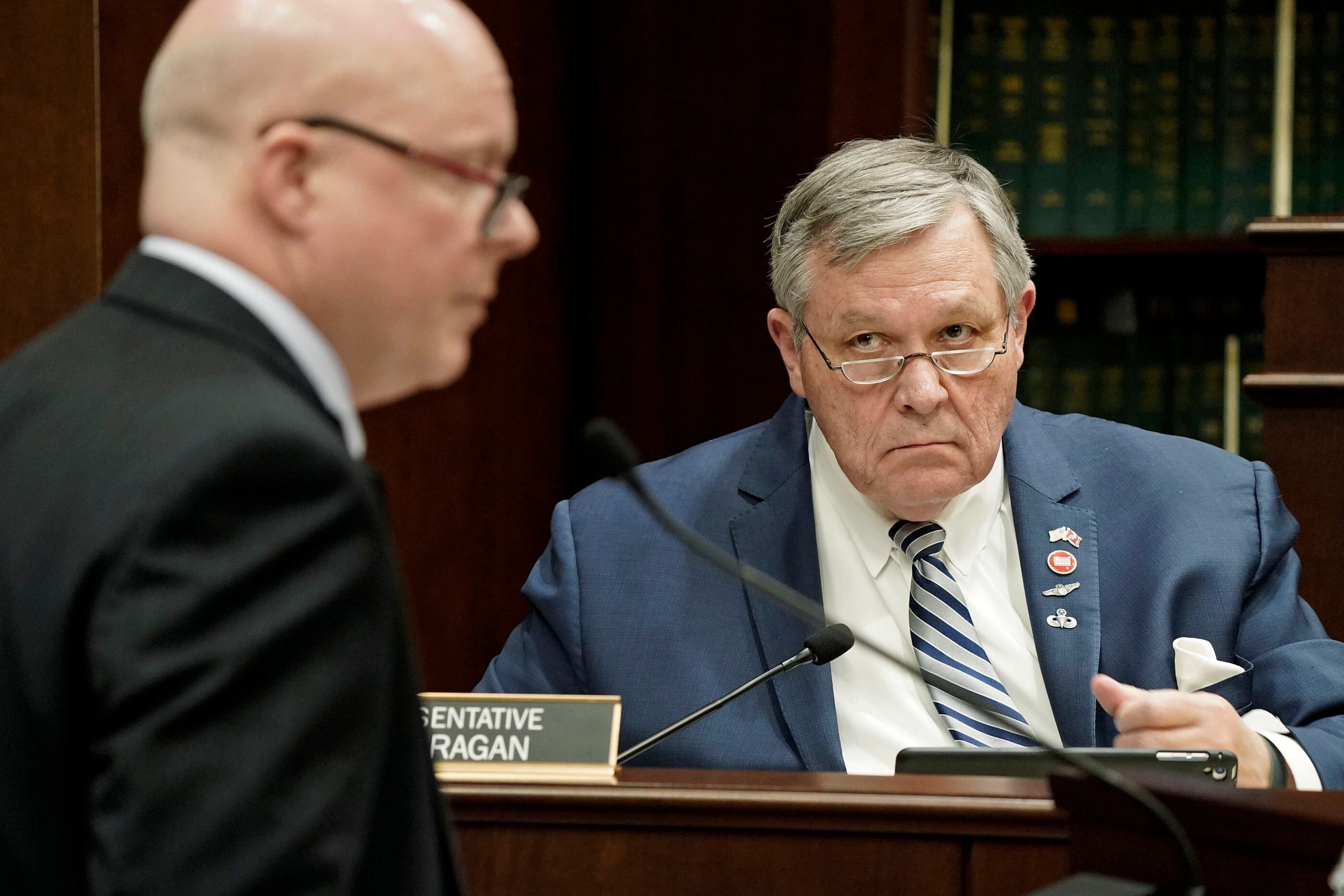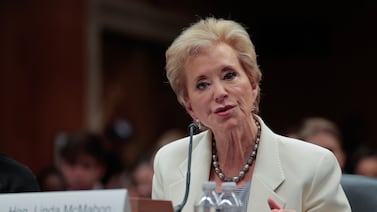Few complaints have been filed — and no penalties levied — since 2021 when Tennessee enacted a controversial law that seeks to regulate discussions on race and gender in K-12 classrooms.
But that could change under new GOP legislation that state lawmakers are scheduled to take up next week.
The bill, filed by Rep. John Ragan of Oak Ridge and Sen. Joey Hensley of Hohenwald, would allow any resident within a public school zone to file a complaint under Tennessee’s so-called prohibited concepts law, which restricts teachers from discussing 14 concepts that the legislature has deemed divisive.
Currently, only students, parents, or employees within a district or charter school can file complaints involving their school, which can lead to disciplinary action. If the state determines that educators have violated the law, teachers can even be stripped of their licenses and school districts can lose state funding.
The proposed change, which observers have dubbed “Prohibited Concepts 2.0,” could open the door to conservative groups like Moms for Liberty to flood their local school boards with complaints about instruction, books, or materials they believe violate the law, even if they do not have direct contact with the teacher or school in question. The organization, with chapters in seven Tennessee counties, has channeled the frustrations of conservative mothers to target issues like mask mandates and curricula that touch on LGBTQ rights, race, and discrimination.
Ragan says investigations should weed out unfounded claims and that he’s more concerned about “taxation without representation.”
“These people are taxpayers who are footing the bill for schools,” he said, “so they should have the right to file a complaint.”
However, the law’s detractors say the change would make a dangerous policy even more dangerous.
“This will place an even greater burden on district personnel to have to chase down complaints,” said Gini Pupo-Walker, state director for the Education Trust in Tennessee. “And it’s going to have another chilling effect on what teachers can teach and how they teach it.”
The legislation is the latest effort by Tennessee conservatives to tamp down on classroom discussions that veer into ideas like systemic racism, sexism, and gender identity, even as the law has generated few formal complaints thus far.
Critics say it’s another attempt to weaponize public education in the current political climate by using charged words such as “indoctrination” to stoke parents’ fears and inflame disagreements about which classroom discussions are appropriate and which ones cross the line.
Few appeals filed, no penalties levied so far
Tennessee was among the first states to enact a prohibited concepts law amid national fury from conservatives about critical race theory, an academic framework that’s sometimes studied in higher education to examine how policies and laws may perpetuate systemic racism.
After reviewing more than 900 public comments about the new law, the state education department developed enforcement rules for everything from how to file and investigate a complaint to how to appeal a decision and what penalties that teachers and districts could face if found in violation of the law. Those rules also set who is eligible to file a complaint.
Since the rules went into effect in late 2021, the department has received two appeals of local decisions, according to spokesman Brian Blackley.
One was filed by a Blount County parent over the book “Dragonwings,” a novel told from the perspective of a Chinese immigrant boy in the early 20th century. The state denied the appeal based on the results of its investigation, Blackley said.
The second was from the parent of a student enrolled in a private school in Davidson County. Because the law does not apply to private schools, the department found that the parent did not have standing to file an appeal under the law.
The department also declined to investigate a complaint from Williamson County, south of Nashville, filed soon after the law was enacted. Robin Steenman, chair of the local Moms for Liberty chapter, alleged the literacy curriculum “Wit and Wisdom,” used by Williamson County Schools in 2020-21, has a “heavily biased agenda” that makes children “hate their country, each other and/or themselves.”
Blackley said the department was only authorized to investigate claims beginning with the 2021-22 school year and encouraged Steenman to work with Williamson County Schools to resolve her concerns.
State rules were set after lengthy public comment process
Steenman was also among hundreds of Tennesseans who wrote the department in 2021 about its pending rules. She asked the state to widen eligibility to file a complaint under the new law.
“Under this rule, our current complaint gets tossed out again (because) I’m not a parent of a currently enrolled student,” she wrote. “Never mind that I am speaking on behalf of hundreds of parents of currently enrolled students! And what about grandparents? How many grandparents are in this group in the defense of their grandchildren?”
Others urged the state to limit eligibility to those who interact directly with the educators they might complain about — criteria that the department went with in its enforcement rules.
But Ragan, the House bill’s sponsor, contends the department missed the mark on complaint eligibility.
“I wrote the original bill. I established the legislative intent. They ignored it,” he told Chalkbeat. “This newest bill would carry out what I originally intended.”
To address concerns of unfounded complaints, the bill says a resident who files a complaint must have “actual or constructive knowledge of the violation.”
Asked whether he’s concerned that time-consuming investigations could distract district personnel from their core duties, Ragan was unapologetic.
“Our system of government is not constrained by how long it takes or how tough it is on employees to do their job,” he said. “That’s what we hire them for.”
His legislation also would require districts and the state to publish on their websites the outcomes of their investigations, as well as “the department’s rationale for upholding or overturning” an appeal.
A chilling effect
The bigger goal, Ragan says, is to encourage teachers and school leaders to review and adjust their instructional practices before a complaint is filed.
While he has called for “facts-based teaching based on the state’s academic standards,” The Education Trust views Ragan’s bigger goal as essentially censorship.
“As a former history teacher, I can say that this law has teachers thinking very carefully about a whole list of topics in their classroom going forward,” said Pupo-Walker. “Portraying slavery in a neutral fashion or the Holocaust in a neutral fashion seems completely absurd, but that is the expectation of lawmakers who support this kind of legislation.”
For instance, after investigating the parent’s complaint in Blount County, the Knoxville-area district announced last August that excerpts from the novel “Dragonwings” would be optional for sixth grade teachers to include in instruction this school year.
In Williamson County, where local complaints about “Wit & Wisdom” led to a months-long review of English language arts curriculum in the its elementary schools, the district removed one fourth grade book, the Newbery Award-winning “Walk Two Moons,” and made “instructional adjustments” to seven other texts.
“Ultimately, this process is tearing at the fabric of connections between schools and communities and their families. It implies that you can’t trust teachers with your children,” said Pupo-Walker.
“Parents know implicitly that’s just not the case with the teachers in their children’s schools,” she added. “But this onslaught of bills is undermining people’s confidence in the intention and the integrity of our educators. It’s destructive.”
You can track the bill on the General Assembly’s website.
Marta Aldrich is a senior correspondent and covers the statehouse for Chalkbeat Tennessee. Contact her at maldrich@chalkbeat.org.






